In 1939, spotting the perennial Krishna river flowing nearby, the green fields suitable for animal husbandry, the nearby railway service connecting to a market like Mumbai -- Bhaskar Ganesh Chitale alias Babasaheb Chitale, the founder of Chitale Group of Industries, started a small milk business at Bhilwadi in Sangli district. He handed over the responsibility of spreading the business in Mumbai to his eldest son Bhausaheb. But Mumbai being a city of migrants, they did not get regular customers, so after two years, they chose Pune, known for its quality consciousness, to spread the business. Along with Bhausaheb, his brother Rajabhau took over the responsibility of running the business in Pune while Nanasaheb and Kakasaheb Chitale concentrated on the collection and processing of milk in Bhilwadi. In the early days, these products were supplied to other vendors. Over time, they themselves started selling the products and launched the ‘Chitale’ brand in Pune. In order to make this brand customer-oriented, Nanasaheb underwent training in milk and milk processing industry. He did his diploma in Dairy Technology from Bengaluru while Kakasaheb secured diplomas in Mechanical and Electrical engineering. They established the milk business by bringing together milk producing farmers. At present, more than 50,000 farmers are connected with the Chitale industry. Along with their own industry, they wanted to ensure financial stability for the farming community as well. So they provided purebred high-yielding milch animals to the farmers and even built independent health facility for those animals.
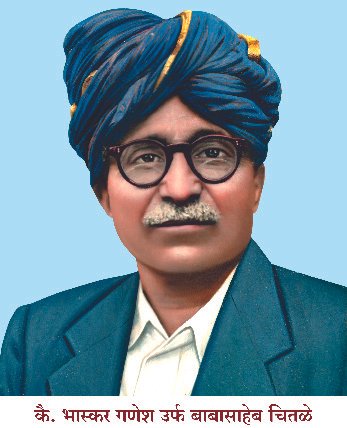
Chitale – International Quality, Pride of Maharashtra
In 1939, a milk revolution in Maharashtra started in the prosperous Sangli district. The industry that has been providing nutritious and good quality milk to the entire Maharashtra for more than eight decades, has had quite an inspirational journey. The white revolution designed by four generations of the Chitale family is fit for any Maharashtra Mahabrand.
They imparted knowledge to the farmers in the pedigree and anatomy of cows and buffalos. They also helped the farmers get benefits like various schemes of NABARD. For this, they were trained in three phases -- Uday, Kiran and Bhaskar which included Cowshed management, Technology and Biotechnology. While Technology involved silage making, use of machinery for milk extraction, Biotechnology included selection of the best animal, producing the best calf from sorted semen within the shed itself. All these brought down the management costs for farmers and milk production doubled in two-three years. To produce high quality cattle semen, Chitale Dairy has collaborated with international companies namely ABS and GENUS. They gave the mantra of getting more milk by spending less to the farmers. Because of this, the business did not remain supplementary to agriculture but became the main source of livelihood and family support for many. Many farmers themselves have become entrepreneurs through their inspiration.
Today, M/S B G Chitale Dairy collects more than 7 lakh litres of milk daily from rural areas. Seventy percent of that milk is distributed in packing bags while from the remaining milk, products like Shrikhand, ghee, curd, butter, chakka (thick curdled milk from which Shrikhand is made), lassi, cheese, paneer, buttermilk, milk powder are made. Chitale milk has reached Pune, Mumbai, Konkan, Nagar, Aurangabad along with Western Maharashtra and they plan to distribute it all over Maharashtra. Instant mixes by Chitale Foods comprising Gulabjam mix, Khaman mix, Medu Vada mix, Idli mix, Jilebi mix, also Chitale Agro products like Mango Pulp, Tomato Ketchup, Flavoured Milk, Mango Jam and Mix Fruit Jam, and Chitale Bandhu Mithaiwale Pune’s products like Bakarwadi, Sweets and Namkeen (non-sweet snacks) have reached the markets across the country and abroad. Their products including Shrikhand have reached major countries like Singapore, Dubai apart from some European countries. Due to the distinct taste of Bakarwadi, for consumers, it is almost like if it is Bakarwadi, it has to be Chitale’s. It has become Chitale’s brand product. Due to the huge demand from all over the world, its production is done by automated machines.

Chitale Dairy paved the way for automation for the Indian dairy business. Besides modernisation, they take care of cleanliness, quality and hygiene. Khawa (whole milk dried/thickened through boiling) is the mainstay of Indian sweets. Chitale industry takes great care to see that the khawa is pure, healthy and of high quality. Chitale enjoys the reputation of being the group producing maximum Shrikhand in the world. Their international quality packing has made them reliable. Along with Shrikhand, their products like ghee, butter, curd and chakka are made in a mechanised manner, and have become favourites with consumers.
Although today, the law has mandated standards in milk production, Chitale industry has adopted them from the very first day of production. That is the reason why they have managed to maintain the international standards for their products. Chitale Bandhu Mithaiwale in Pune was the first retail store in the country to comply with HACCP as long back as 1999.

In order to make all the products of Chitale available to the consumers under one roof, Chitale Express Brand Shoppe was started in Kolhapur. Currently, there are about 21 brand shops across the state including in Pune, Mumbai, Aurangabad and Nagpur while two of their own shops and 18 franchises are operational in Pune. All these stores sell packed sweets that can last long. Buoyed by the response these stores have received, they have plans to start 200 shops across the country. During the Corona pandemic, these stores proved their worth by offering home delivery service. The tree that was planted by Babasaheb, was nurtured by four people of the second generation. Then from the third generation, Madhavrao, Shrikrishna, Shripad, Sanjay, Vishwas, Anant, Girish and Makarand further contributed to the growth of the tree and shaped it. Now the fourth generation comprising Kedar, Indranil, Nikhil, Atul, Rohan and Pushkar are embracing changes that come along with changing times and working to expand the business. Despite the large size of the industry, care is taken to ensure that consumers regularly get fresh milk and dairy products. Quality has been this industry leader’s strong point and they have never compromised with it. From producer, manufacturer directly to the consumer -- they have kept the chain of quality products intact. To maintain the quality, they lay constant emphasis on research and quality control. And for that, the dairy has developed its own processes and farming techniques. They give serious thought to the fact that milk products being perishable, there should not be any impact of the natural environment on them. Along with that, they consciously indulge in sustainable environment conservation.
The milk producing farmer is the chief factor in this industry. Chitale industry has always been at the forefront to ensure that the farmer gets good and fair returns for his labour. They have floated various schemes to get maximum milk production with minimum expenses. Along with the farmers, the contribution of the staff is important to them too. So they provide the staff with a healthy and positive work environment. In addition to providing them all the facilities, they also give them a pat on the back by taking up various activities. While insisting on welcoming the new technology, they have also been ready to face the changes that come with changing times. It was Chitale Dairy that first brought the state-of-the-art milk packing system in the country and they have created their own fast and safe transport system to distribute their products by constantly adopting newer technologies.
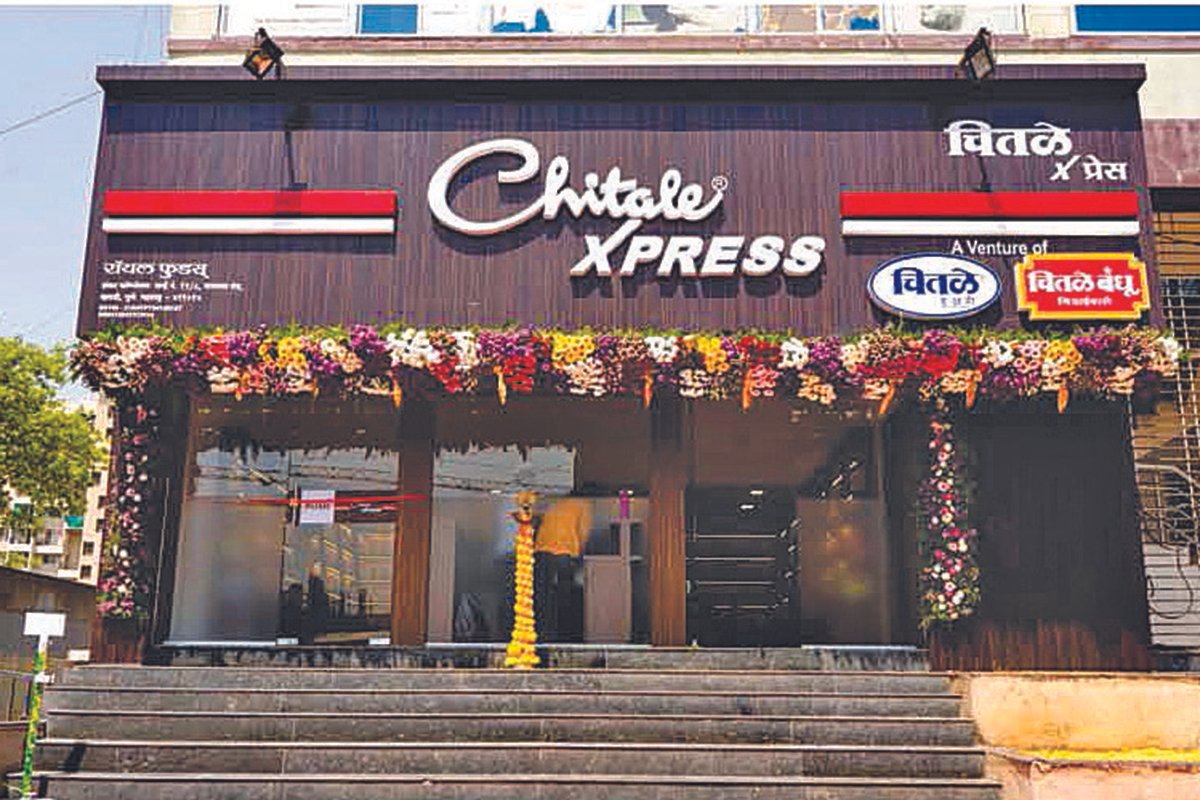
The brand shop started to make Chitale’s products available everywhere along with Pune
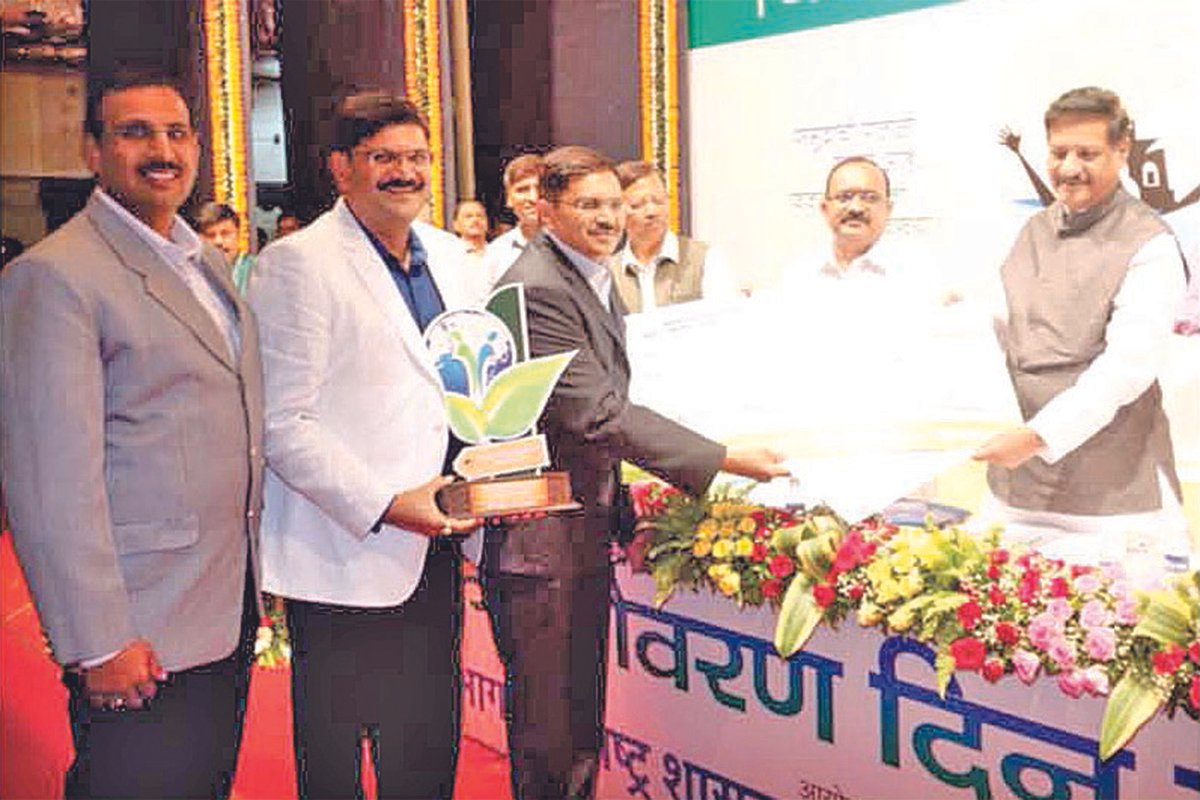
Maharashtra government’s Vasundhara Award for environment equilibrium
Social Commitment
The Chitale Group of Industries has always showed a strong sense of social responsibility. The graph of their social work is as elevated as that of their industrial growth. The Chitale family is directly involved in social work. They have always maintained that they owe something to society and that is why they have a strong bond with society. This industry has become the fosterer of many families. They have contributed in a big way to Gram Swachchta Abhiyan. They have inspired many villages and many of them have won awards. They insist that the development activities should always last long. They have always come forward to give a helping hand in natural calamities like earthquake, cyclones, floods, drought, etc. They have been constantly giving substantial donations to the Prime Minister’s, Chief Minister’s and other Relief Funds. During the catastrophic flooding of the Krishna river, this industry is always at the forefront in providing essentials, shelter and medicines to the flood-affected, taking care post-flood public hygiene, providing fodder and health facilities to livestock.
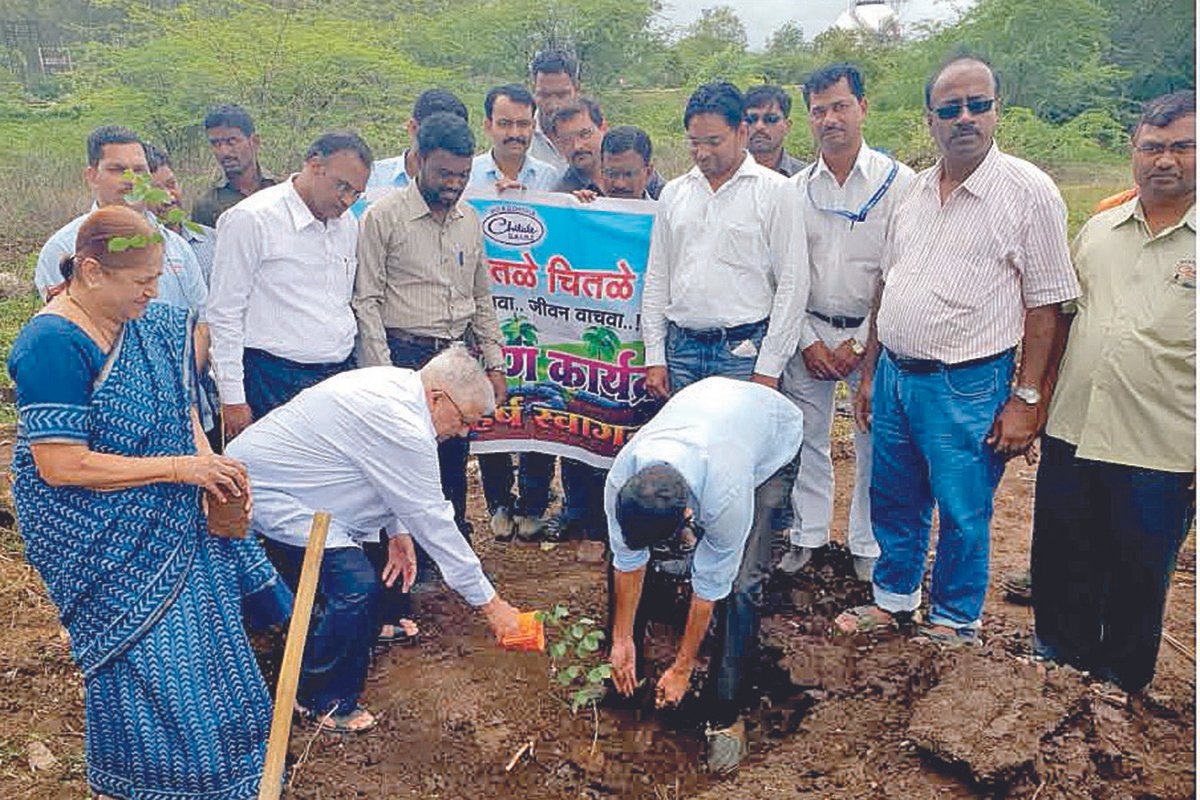
चितळे उद्योग समूहातर्फे श्री. व सौ. नानासाहेब चितळे व इतर यांच्या उपस्थितीत वृक्षारोपण करताना.
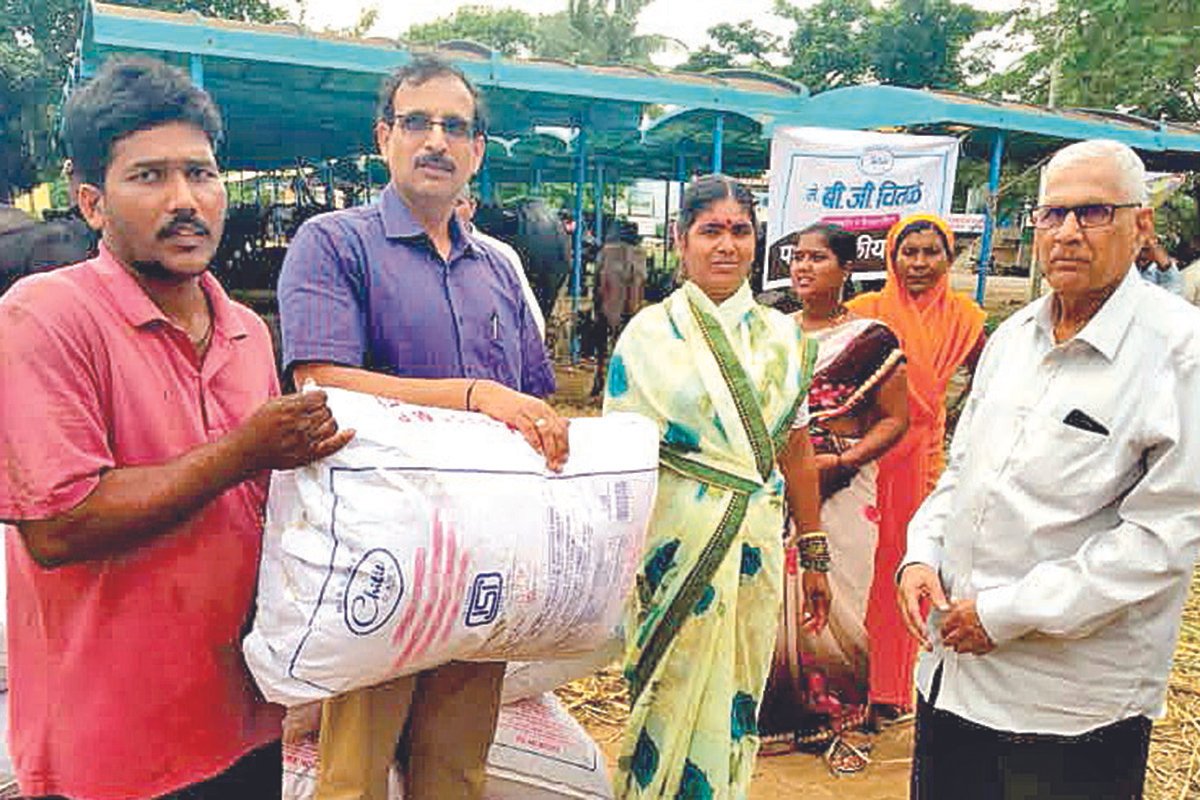
चितळे उद्योग समूहातर्फे काकासाहेब चितळे व इतर यांच्या उपस्थितीत चारा छावणीला मदतीचा हात.
To save livestock during a drought, they have always helped fodder camps. Even during a pandemic like the Corona one, they haven’t hesitated to help. This industry is at the forefront of religious, cultural, literary, heritage conservation and public activities. They have been extending help to players and sports circles in the district and constantly contributing to the education sector as well. They have been actively promoting and spreading movements like body donation, blood donation and eye donation. They have helped schemes like constructing roads, public toilets, pickup sheds and hospitals in rural areas and also helped schemes like Takari-Mhaishal lift irrigation scheme. By constantly planting trees, they contribute to environment conservation. This all-encompassing progressive industry has surely has a bright future. This conglomerate will always contribute to the progress of Maharashtra and the State and Union governments will surely take note of it.
National Productivity Award
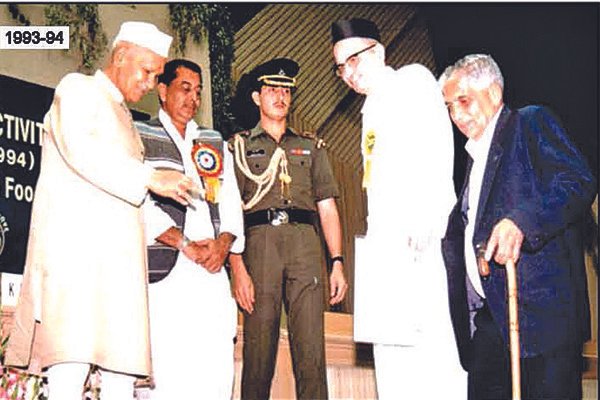
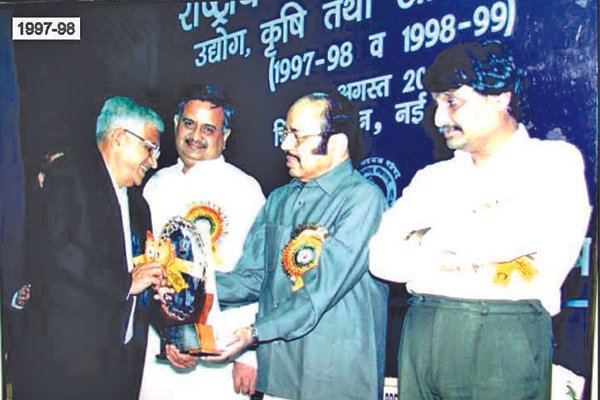

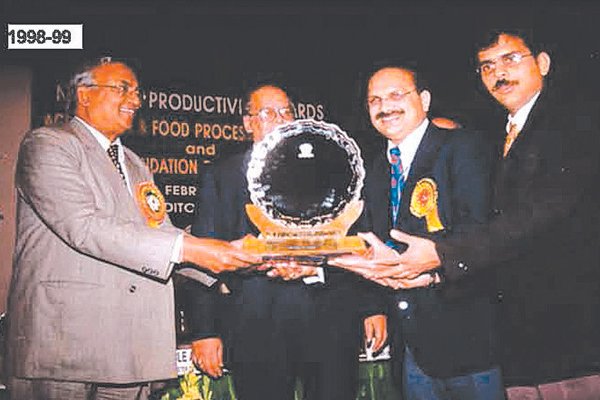
Innovation, modernisation and automation
- This conglomerate brought innovation to the business from the very beginning which gave prestige to the industry. There are many examples of the perfect combination of modernisation and mechanisation
- From 1939 to 1964, all the processes were being carried out in the traditional way. Ice had to be brought from Pune. With the introduction of electrification in 1964, use of machines started.
- 1974 - For the first time in India, they started using polythene pouches for packing milk. They also started the production of crates required for it and insulated trucks for transportation. This helped increase the shelf life of the milk. They also started using machines for milking animals.
- 1976 - Bakarwadi production began.
- 1980 - India was producing 22% of the world’s milk. To increase that further, they brought buffaloes of Mhaisana and Murha breed from Gujarat and Jersey and Houston breeds from Bengaluru for the farmers in their areas. They also fostered them and took care of their medication, thereby increasing milk production.
- 1984 – When the world was getting to know computers, Chitale Industries Group started using computers in every department and increased productivity, accuracy and quality. They also started giving computerised bills to farmers supplying them milk.
- 1996 – They launched a laboratory for the diagnosis of the cattle and their scientific breeding. So frozen semen could be made available. They also started using radio frequency identification (RFRD) tag to maintain the livestock records and set up a call centre where they ran an activity called ‘Cow to Cloud’. This made the data of each animal available to farmers. Now farmers could get information about the animal’s fertility, milk production and the quality of the milk. The farmers started getting benefitted from it. In 1999, they started a diagnostic laboratory and research on cattle breeds, metabolism, etc.
- 1998 – They established a new company called Chitale Foods and considering the growing demand for instant foods, launched Instant Gulabjam Mix in the market. Along with that, they also started the production of Idli, Medu Vada, Khaman and Jilebi Mix.
- 2001 - Chitale Agro was launched and the production of mango pulp by processing mango juice started. They began selling it in European countries and Japan. Next, the production of Amrakhand started. In addition, they also started making tomato ketchup, jams and flavoured milk.
- 2010 – They brought Shrikhand and curd products in FFS (Form, Fill and Seal) packs. Chitale became the first company in India to produce chakka by using the modern hydraulic method. They started making curd, cheese, Shrikhand, paneer, and ghee with the similar method. Chitale Dairy became a global guide by using digital technology.
- 2011 - Chitale Dairy introduced a programme called Genetic Mating System (GMS) on cloud. It gave ratings to animals on a number of criteria. They analysed the data and started using it for the right mating of the animals. As a result, the production of Indian buffalo milk increased from the average of 800 litres per year to 2,500 to 3,000 litres per year. They have collaborated with two companies -- ABS and GENUS – to produce high quality semen from selected Indian oxen and male buffaloes.
- 2015 – Bulls of excellent pedigree were brought and high quality semen was produced from them.
- 2018 – Birth of Durga, the world’s first buffalo born with the use of sexed semen technology
- 2019 - Launch of Chitale Express brand shop.


The Chitale Group of Industries in Bhilwadi which has been using high-end technology and automated machinery in the manufacturing process
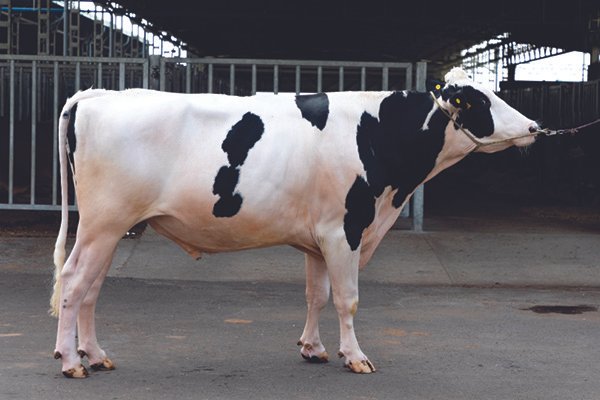
The high pedigree bull used for semen technology (2015)
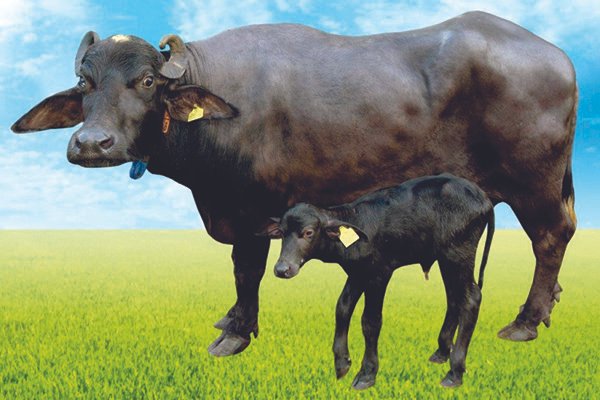
Durga, the world’s first buffalo born with the use of sexed semen technology (2018)
Milk and a lot more
In 1950, Chitale rented a shop in Kunte Chowk, Pune and opened a sweet shop there. The second branch was started in 1954 at Deccan Gymkhana. After the 1961 Panshet flood, the shop at Kunte Chowk shifted to Bajirao Road and continues to be operational there even today.
Did you know?
- A journey of four generations and 81 years.
- 50,000 farmers are attached to Chitale Dairy.
- The highest Shrikhand selling brand in the world.
- Every day, 5,000 kg production of Bakarwadi, the brand product of Chitale Bandhu Mithaiwale.
- Along with 4 lakh sorted semen per year, production of more than 35 lakh doses for distribution across India
